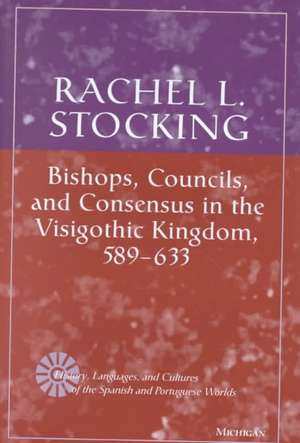Bishops, Councils, and Consensus in the Visigothic Kingdom, 589-633: History, Languages, And Cultures Of The Spanish And Portuguese Worlds
Autor Rachel L. Stockingen Limba Engleză Hardback – 8 ian 2001
The medieval Visigothic kingdom--even after the full-scale conversion of the population from Arianism to Catholicism--was barely held together by a fluctuating mixture of tradition inherited from Roman law, Germanic and provincial influences, local custom, and Catholic values. In her study of a society riddled with instability and conflicting paradigms of power, Rachel Stocking dissects the social meaning of consensus in the early medieval state. Using the compelling example of contemporary records and by drawing out the often-conflicting aspirations of kings and bishops, she addresses the dynamic and contradictory relationship between the ideals of Christian governance and early medieval social conditions.
This eloquently presented, exhaustive study concludes that legislation, however persistently enacted, was unequal to the task of remedying a lack of unity and other social and political ills. Notions of consensus are explored as a way of maintaining community cohesion and order in the absence of strong central authorities. Other issues the author confronts are Catholic tolerance and intolerance toward heterodox and non-Christian "others;" the transformation and transmission of ancient ideals and social structures from the Roman to the later medieval worlds; and the position of medieval Spain in relation to the mainstream of western European history.
This nuanced study is a must-read for anyone interested in medieval life, politics, religion, and the precarious nature of the medieval state.
Rachel Stocking is Professor of History, Southern Illinois University at Carbondale.
This eloquently presented, exhaustive study concludes that legislation, however persistently enacted, was unequal to the task of remedying a lack of unity and other social and political ills. Notions of consensus are explored as a way of maintaining community cohesion and order in the absence of strong central authorities. Other issues the author confronts are Catholic tolerance and intolerance toward heterodox and non-Christian "others;" the transformation and transmission of ancient ideals and social structures from the Roman to the later medieval worlds; and the position of medieval Spain in relation to the mainstream of western European history.
This nuanced study is a must-read for anyone interested in medieval life, politics, religion, and the precarious nature of the medieval state.
Rachel Stocking is Professor of History, Southern Illinois University at Carbondale.
Preț: 493.69 lei
Preț vechi: 627.91 lei
-21% Nou
Puncte Express: 741
Preț estimativ în valută:
94.48€ • 98.04$ • 78.97£
94.48€ • 98.04$ • 78.97£
Carte indisponibilă temporar
Doresc să fiu notificat când acest titlu va fi disponibil:
Se trimite...
Preluare comenzi: 021 569.72.76
Specificații
ISBN-13: 9780472111336
ISBN-10: 0472111337
Pagini: 232
Ilustrații: 1 map
Dimensiuni: 152 x 229 x 23 mm
Greutate: 0.53 kg
Ediția:First Edition
Editura: UNIVERSITY OF MICHIGAN PRESS
Colecția University of Michigan Press
Seria History, Languages, And Cultures Of The Spanish And Portuguese Worlds
ISBN-10: 0472111337
Pagini: 232
Ilustrații: 1 map
Dimensiuni: 152 x 229 x 23 mm
Greutate: 0.53 kg
Ediția:First Edition
Editura: UNIVERSITY OF MICHIGAN PRESS
Colecția University of Michigan Press
Seria History, Languages, And Cultures Of The Spanish And Portuguese Worlds
Notă biografică
Rachel Stocking is Professor of History, Southern Illinois University at Carbondale.
Recenzii
"Stocking's analysis of specific councils and the contentious bedrock from which they arose is vigorous, scholarly, and engaging, especially when narrative sources supplement conciliar analysis. . . . In highlighting the immense diversity of social, cultural, and religious concerns that underlay expressions of authority, Stocking's book has much to engage the early medievalist."
—Isabel Moreira, University of Utah, American Historical Review, April 2002
—Isabel Moreira, University of Utah, American Historical Review, April 2002
"Stocking's excellent study, fully informed by the best recent scholarship on the place and period, subjects a critical part of that concilliar and royal history to devastating and learned scrutiny. . . Stocking deftly analyzes the tensions among consensus, coercion, and conflict between centralizing ideals and local interests."
—E. Peters, Choice, October 2001
—E. Peters, Choice, October 2001
". . . a splendid book, clearly written and full of thought-provoking ideas. Stocking's careful, perceptive, and engaging discussions and her firm grasp of the sources, both primary and secondary, make this book a major contribution to the study of Visigothic Spain."
—Yitzhak Hen, University of Haifa, Mediterranean Historical Review, June 2002
—Yitzhak Hen, University of Haifa, Mediterranean Historical Review, June 2002
". . . Bishops, Councils, and Consensus in the Visigothic Kingdom makes important contributions to our knowledge of the ideas that informed those councils and to our understanding of the political and social order of the Visigothic world. . . . We see how authorities struggled to reconcile competing visions of consensus and how councils often failed to achieve their objectives. . . . The book affords a rich portrait of Visigothic Spain and in doing so touches on key themes in the historiography of Spain more generally, such as the distinctive evolution of Iberian institutions, the (at times) ill-fated quest for spiritual and political unity, and varieties of religious intolerance. In Stocking's account we see the interface of venerable legal and intellectual traditions, on the one hand, and the rough-and-tumble contours of power in Visigothic Spain, on the other; we see that the story of these councils is the story of lofty hopes that were often thwarted and often renewed."
—Jeffrey A. Bowman, Kenyon College, Speculum, January 2003
—Jeffrey A. Bowman, Kenyon College, Speculum, January 2003
Descriere
Portrays the power struggles among medieval rulers, sacred and profane




